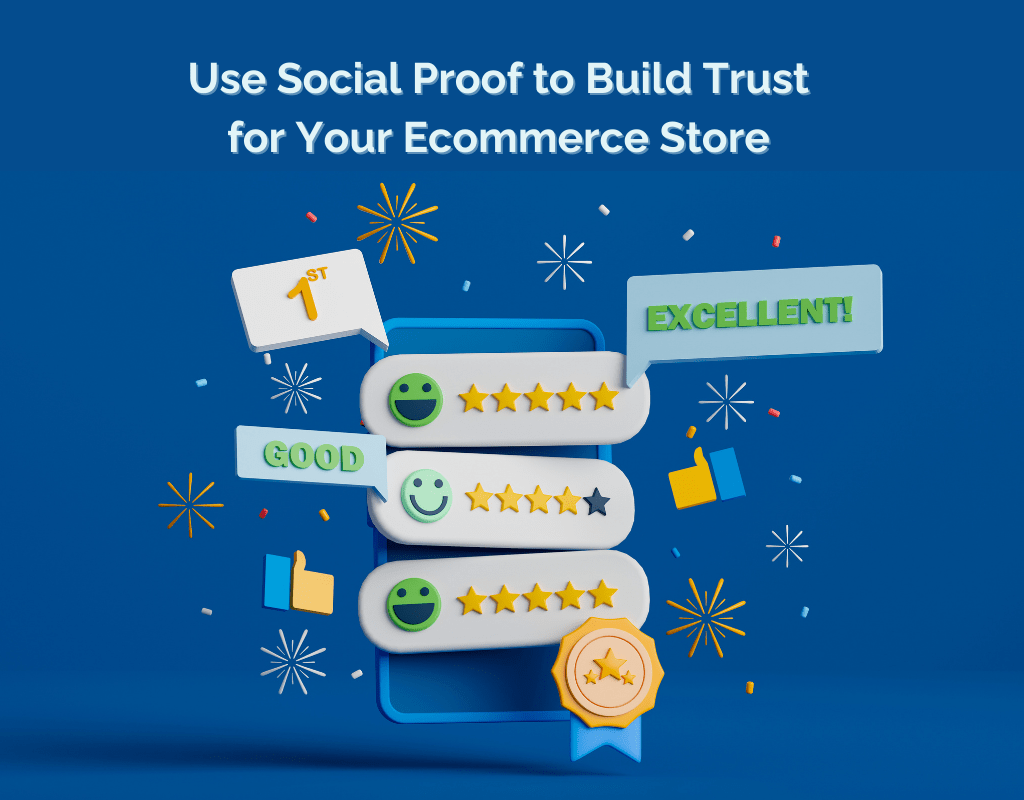Building trust with potential customers is essential for driving sales and fostering long-term relationships. While traditional marketing tactics can certainly help, leveraging social proof offers a powerful way to establish credibility and inspire confidence in your brand. In this blog, we’ll share the tactics of social proof and how they can be effectively utilized in ecommerce marketing.
1. Reviews and Ratings: Customer reviews and ratings are among the most influential forms of social proof in ecommerce. Positive reviews reassure potential buyers of the quality and reliability of your products or services, while negative reviews provide valuable feedback for improvement.
Displaying star ratings prominently on product pages, along with written reviews and testimonials, can help build trust and encourage hesitant shoppers to make a purchase.According to a survey by Bright Local, 88% of consumers trust online reviews as much as personal recommendations, highlighting the importance of reviews in ecommerce marketing.
2. Bestsellers and Popular Products: Highlighting bestsellers and popular products on your ecommerce website can serve as social proof of their popularity and quality. Featuring a “Bestsellers” or “Most Popular” section can help guide shoppers to products that are tried and tested by other customers, instilling confidence in their purchasing decisions.
3. What Others Bought: “What others bought” or “Customers also bought” recommendations provide social proof by showing shoppers what products are frequently purchased together.This feature not only helps increase average order value by encouraging additional purchases but also builds trust by showcasing products that are popular among other customers.
4. Expert Reviews and Endorsements: Expert reviews and endorsements from trusted sources in your industry can provide valuable social proof of your products’ quality and efficacy.Seek out reviews from reputable publications, influencers, or industry experts, and prominently display them on your website to enhance credibility and build trust with potential customers.
5. User-Generated Content on Social Media: User-generated content (UGC), such as photos, videos, and testimonials shared by satisfied customers on social media, serves as authentic social proof of your brand’s popularity and satisfaction.Encourage customers to share their experiences with your products or services on social media using branded hashtags and repost their content on your own social channels to showcase real-life examples of your products in action.
6. Influencer Marketing: Partnering with influencers who align with your brand values and target audience can help amplify your social proof and reach new audiences. Influencers can create authentic content featuring your products, share their experiences, and recommend them to their followers, leveraging their trust and credibility to drive sales.
7. FAQs and Support: Providing comprehensive FAQs and responsive customer support demonstrates your commitment to customer satisfaction and builds trust by addressing common questions and concerns.Make sure FAQs are easily accessible on your website and include detailed information about products, shipping, returns, and other important policies.
8. Urgency and Scarcity: Creating a sense of urgency or scarcity through limited-time offers, flash sales, or low stock alerts can drive conversions by tapping into the fear of missing out (FOMO).Highlighting limited quantities or limited-time discounts can encourage hesitant shoppers to take action and make a purchase before it’s too late.
9. Testimonials and Trust Badges: Testimonials from satisfied customers, along with trust badges from reputable third-party organizations such as BBB, Verisign, or Trustpilot, can help instill confidence and alleviate concerns about security and trustworthiness.Display these badges prominently on your website, especially on checkout pages, to reassure customers that their personal and financial information is safe and secure. In conclusion, leveraging social proof is one of the most effective ways to build trust and credibility in ecommerce marketing. By incorporating elements such as reviews and ratings, bestsellers, what others bought recommendations, expert reviews, user-generated content on social media, influencer marketing, FAQs, urgency, testimonials, and trust badges, businesses can inspire confidence in their brand and drive conversions. As a leading digital marketing agency in Dubai, we understand the importance of social proof in building trust and driving conversions and work with businesses to build trust, drive engagement, and increase sales. Contact us today to learn how we can help you elevate your ecommerce marketing strategy and achieve your business goals.





